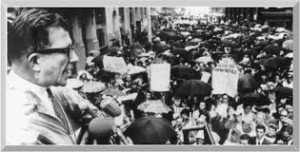By Mark Wallace on March 10, 2011
 Unions are one of the biggest problems in America. Why? For starters, consider this. No one ever got to be union president by assuring her rank-and-file that the glass is half full. Union leaders are always entirely about creating discontent among the rank-and-file, even when none would exist without their efforts. Why? Because if they don’t, they know they will be challenged for union leadership by even more militant cronies. Therefore, the inexorable trend within any union is to create (not recognize the existence of, but create) more and more discontented members.
Unions are one of the biggest problems in America. Why? For starters, consider this. No one ever got to be union president by assuring her rank-and-file that the glass is half full. Union leaders are always entirely about creating discontent among the rank-and-file, even when none would exist without their efforts. Why? Because if they don’t, they know they will be challenged for union leadership by even more militant cronies. Therefore, the inexorable trend within any union is to create (not recognize the existence of, but create) more and more discontented members.
No matter what they are given, the leadership will always be telling them that it wasn’t enough. Even if we had a “give your house to a teacher day,” where parents surrendered their houses and gave them, free and clear, to their children’s teachers, one month later the unions would be demanding more. Why? Because the only way their leaders can remain in power is always to demand more.
It’s entirely about class warfare, the politics of envy, and creating, and then fueling the flames of, an “us vs. them” attitude. It’s also about creating an attitude of entitlement among the rank-and-file. “You work hard; you deserve a raise.” Not if there’s no money to pay for it. A lot of workers throughout history have worked hard at companies that fell on hard times or even went out of business. Why should teachers be immune to the laws of economics?
Now, this conduct may have had some purpose one hundred years ago, when the employer was a so-called “robber baron.” But who is the employer today? Why, in a school district, the employer is … the parents and the taxpayers. A waitress or carpenter, struggling to make ends meet, or an office worker laid off and running out of savings or unemployment compensation, still has to  pay taxes (sales and property taxes, if nothing else), to fuel the insatiable blood lust of the union vampires. Worse, with public sector unions, what the union seeks is to control both sides of the bargaining table, with the taxpayer as a helpless spectator whose only role is to bleed. That wasn’t possible with industrial unions, where it was strength against strength.
pay taxes (sales and property taxes, if nothing else), to fuel the insatiable blood lust of the union vampires. Worse, with public sector unions, what the union seeks is to control both sides of the bargaining table, with the taxpayer as a helpless spectator whose only role is to bleed. That wasn’t possible with industrial unions, where it was strength against strength.
Remember, no matter how much we give the teachers, it will never be enough for the union. Why not? Because the instant their leadership signals contentment, their more militant cronies will eject them from office and carry on the Jihad.
The other key principle of union conduct throughout history is to resist, at all costs, any attempt to differentiate among workers by performance. Unions have always feared that this could lead to “divide and conquer” behavior by employers, and could be used to punish (among others) workers who led union organizing attempts. But it also solidifies the power base of the union bosses, because there will no member more loyal than one who is keeping a job she wants but doesn’t deserve, only because her union has forbidden performance evaluations.
The practical consequence in today’s world is the implicit (if not explicit) insistence that there is no such thing as a bad teacher, at least after tenure is granted, which can be as soon as two years after initial hiring. (Side note: Union terminology represents a hijacking of the original meaning and purpose of tenure.) This makes it virtually impossible to get rid of (say) the worst performing 5 to 10% of teachers, while simultaneously tempting others to reduce their efforts, because they know that they will be safe no NEA matter how little effort they give.
I believe it was in the documentary film, “Waiting for Superman,” that a professor of education observed that replacing the worst performing 5% (or so) of teachers would virtually eliminate the student performance deficit between the U.S. and the 20 (or so) other countries whose students perform significantly higher than ours on international evaluations. It will never happen so long as the unions retain their death grip on public education.
It will never happen so long as the unions retain their death grip on public education.
For those of you who think that the teachers’ union gives a damn about your kids, I will leave the last word to the preeminent teachers’ union boss of our era, Al Shanker:
“When school children start paying union dues, that’s when I’ll start representing the interests of school children.”




